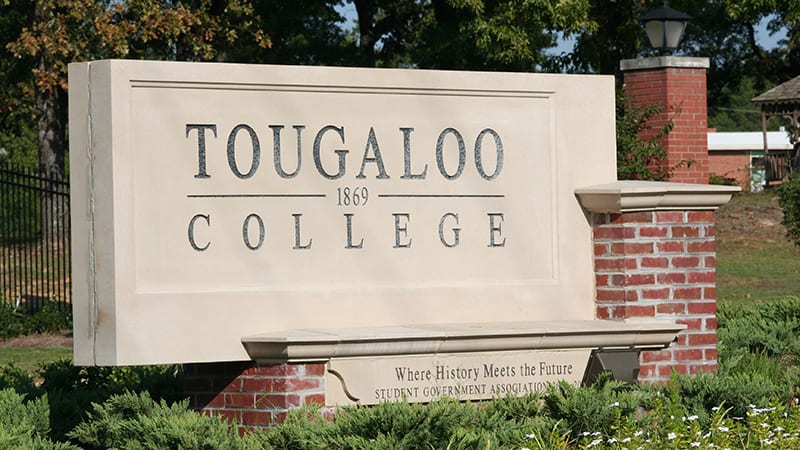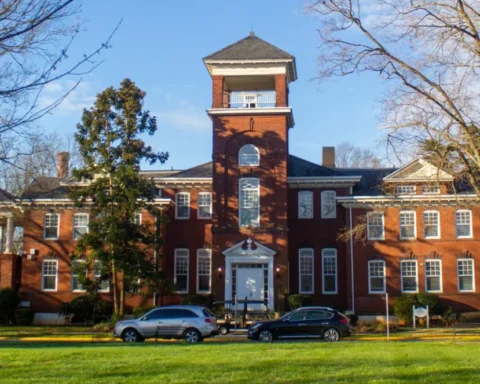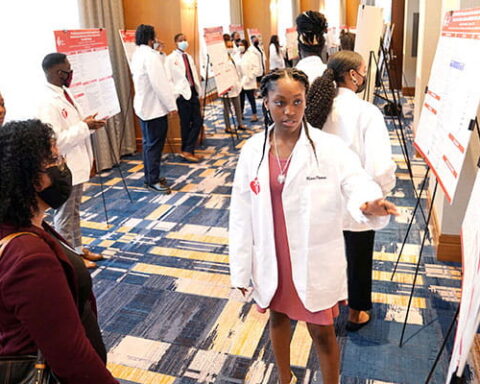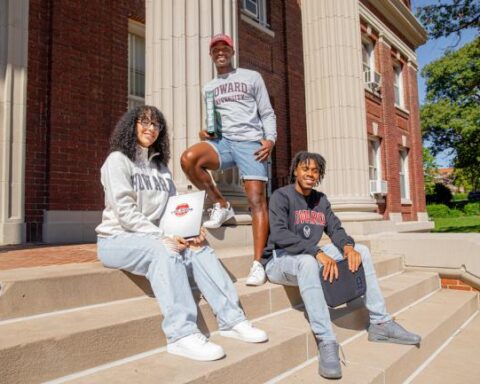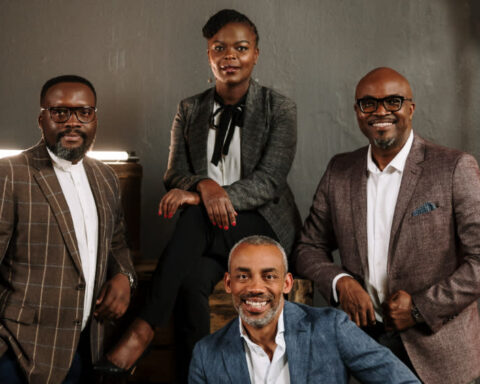By Tougaloo College
A generous $10 million gift from Netflix CEO Reed Hastings and documentary film producer Patty Quillin will provide a major boost in scholarship support for students at Tougaloo College, a historically Black college in Tougaloo, Mississippi.
The gift will fund much-needed financial aid for Tougaloo students working toward careers in medicine, public health, the sciences, education, business and other fields and aspiring to make a positive impact on their communities after graduation. It will also support Tougaloo students participating in a unique and enduring 58-year-old partnership between Brown and Tougaloo, which has connected generations of students, faculty and staff from both institutions through academic exchanges, fellowships, research projects and other initiatives.
Hastings and Quillin, a California-based couple who are longtime champions of equity in education, have supported Historically Black Colleges and Universities (HBCUs) with multiple gifts over time, driven by the outsize role that HBCUs play in educating Black leaders who make a positive impact in a wide range of professions.
“HBCUs have been vastly undervalued for a long time,” Hastings and Quillin said. “They have an incredible track record of graduating so many Black leaders across the U.S. — doctors, lawyers, engineers and more. By investing in the extraordinary students who attend Tougaloo and Brown, we’re investing in America’s future.”
Of the total gift, $5 million will go to Tougaloo College to bolster the school’s endowment and provide annual scholarship funding that directly supports high-achieving students with high financial need. Hastings joined Tougaloo President Carmen J. Walters and other college leaders in a visit to the Mississippi campus on Monday, Feb. 21, that included the opportunity to meet with students and faculty members.
Walters said the funds will provide crucial need-based scholarships to deserving and talented undergraduates, including many who continue to contend with the economic impact of the COVID-19 pandemic.
“The remarkable personal gift to the historic Brown-Tougaloo Partnership from philanthropists Reed Hastings and Patricia Quillin will transform the lives of Tougaloo College students,” Walters said. “This donation, setting a new precedent as the largest gift to the Brown-Tougaloo Partnership, is a living testimony to their strong belief in the value of giving, the value of education and the value of HBCUs. This transformative gift is a life-changing opportunity for our students, and the impact will be far-reaching.”
The remaining $5 million will establish the Brown-Tougaloo Partnership Scholarship Fund as part of Brown University’s endowment. The fund will provide annual support for Tougaloo students who come to Brown as part of the partnership, whether to pursue a graduate or medical degree or an academic exchange program.
“Brown and Tougaloo share a deeply held commitment to preparing graduates to make a positive impact in their communities,” said Brown President Christina H. Paxson. “Our shared ideals serve as an unbreakable foundation for a 58-year-old partnership that has yielded important insights for students and scholars, infused both campuses with new perspectives and provided life-changing experiences for Tougaloo and Brown students. This generous gift from Reed Hastings and Patty Quillin ensures that this truly one-of-a-kind partnership will continue to expand for many decades to come.”
Building on an enduring partnership
The gift from Hastings and Quillin is the largest philanthropic commitment to the longstanding Brown-Tougaloo Partnership, which began in 1964 during the Civil Rights Movement.
That year, as Tougaloo College became a known refuge for activists and a central meeting point for movement organizers, the Mississippi State Legislature introduced bills to revoke Tougaloo’s charter and prevent its graduates from becoming teachers in the state. A group of concerned Providence citizens with ties to Mississippi approached then-Brown President Barnaby Keeney and asked for help to support Tougaloo. Months later, the two institutions had drawn up an agreement that began with a student exchange program funded by the Rockefeller and Ford foundations.
Fifty-eight years later, the agreement has grown into a strong, multifaceted partnership offering opportunities for student and faculty academic exchanges and collaborative research ventures. Since its inception, more than 760 Tougaloo and Brown students and faculty have participated in the program. Undergraduate participants spend time learning on the respective campuses, faculty build research collaborations, and Tougaloo graduates pursuing medical careers come to Brown’s Warren Alpert Medical School through an early-identification program. Most recently, Brown’s School of Public Health created a Health Equity Scholars program, which each year admits an exceptional cohort of master of public health students from Tougaloo and other HBCUs.
The new Brown-Tougaloo Partnership Scholarship Fund enabled by the gift will ensure that participating Tougaloo students have access to myriad academic and fellowship opportunities at Brown. With an estimated initial annual payout between $200,000 and $250,000 (a number expected to grow over time) the fund will have the capacity to support a range of Tougaloo students with costs ranging from tuition for pursuing graduate or medical studies at Brown to undergraduate semester exchange programs.
Carey Williams, a senior biology major from Lexington, a small, rural town in the Mississippi Delta, is one student who will pursue an M.D. at Brown after graduating from Tougaloo. As a sophomore, Williams was admitted to an early-identification program (EIP) at Brown’s Warren Alpert Medical School.
“For as long as I can remember, I wanted to be a medical doctor, and I want to serve my community by providing health care in underserved communities,” Williams said. “The program afforded me opportunities to study at Brown for a semester, meet and experience people of different cultures, and gain an invaluable structured introduction to the elements of rigor and expectations toward the world of medical school. This program opened doors for me that I did not know existed.”
Williams will graduate from Tougaloo College in May 2022 before heading to Providence for medical school.
“The scholarship made possible by Reed Hastings and Patricia Quillin will give me the financial freedom to accomplish my educational goals at Brown,” Williams said. “The EIP program has allowed me to become more confident than ever in my pursuit of a career in medicine. The Brown-Tougaloo Partnership has changed my life for the better.”
Separately, the $5 million gift directed to Tougaloo’s endowment will help the college address students’ financial needs on its Mississippi campus, which have become particularly acute in the last two years. Walters said cost has always been a barrier to attracting and retaining talented students — about 80% of Tougaloo students require need-based scholarship assistance — and the COVID-19 pandemic has only exacerbated their financial hardships. National data show that between higher infection rates and higher unemployment rates, the pandemic has disproportionately affected Black Americans. Tougaloo students were no exception: A rising number needed to put their academic dreams on hold in order to support themselves and their families in 2020 and 2021.
The gift from Hastings and Quillin will address the college’s pressing need for more need-based scholarship funds by increasing Tougaloo’s total endowment by 22% — significantly boosting the college’s ability to provide scholarship support to current students, and also allowing it to recruit more talented students who might not otherwise be able to attend.
Personal commitment to supporting equity in education
The gift to support Tougaloo and Brown is part of a long legacy of education-focused philanthropy for Hastings and Quillin, who have long invested in providing better education to kids and young adults with the highest need, including students of color from low-income families.
Hastings has been dedicated to supporting equity in education since his 20s, when he joined the Peace Corps and traveled to Swaziland to teach mathematics. Since co-founding Netflix in 1997, he has supported numerous education initiatives focused on equity and excellence, locally and nationally. He serves on the board of directors for the KIPP Foundation, which runs a national network of tuition-free charter schools serving low-income communities of color, and City Fund, a nonprofit that partners with local leaders to create innovative public school systems.
Quillin serves on the board of directors at Cabrillo College in Aptos, California, where 47% of students identify as Hispanic or Latino and 14% come from households that earn $20,000 or less per year. She is also a director of Re:Store Justice, an Illinois nonprofit that promotes fair criminal justice policies and helps provide rehabilitation for those who have been incarcerated; more than half of Illinois’ incarcerated population is Black.
In 2021, the couple donated to Brown’s Emergency Curricular and Co-Curricular Gap Fund, which provides financial relief to high-need students at the University who are navigating unique circumstances related to life, work, co-curricular and curricular opportunities, and academics. E-Gap funds have equipped students with the technology they needed to study remotely during the pandemic, covered the cost of travel to conferences and symposia, helped them buy winter clothing and provided relief following emergency medical procedures.
In June 2020, amid a national reckoning with anti-Black racism, Hastings and Quillin gave $120 million to the United Negro College Fund and Morehouse and Spelman colleges, marking the largest-ever single donation to HBCUs. The gifts to Morehouse and Spelman have already funded scholarships for dozens of college-bound Black students, according to leaders of those colleges interviewed by the Wall Street Journal, and the donation to UNCF has helped many of its 37 HBCU members return to in-person operations after the first months of the COVID-19 pandemic presented major financial challenges, including reduced enrollment and lost revenues.
Hastings said he feels strongly about supporting HBCUs because their endowment funds typically fall far short of other higher education institutions, yet they are powerful engines of upward mobility for Black Americans. According to data from the University of Pennsylvania and the business magazine Black Enterprise, HBCU graduates comprise 50% of the nation’s Black lawyers, 40% of its Black engineers and 24% of Black Americans who earn degrees in STEM subjects.
“HBCUs empower Black students to achieve their dreams, and that is a great thing to bring attention to,” Hastings said. “Investing in the long-term health of these colleges and universities will help ensure a diverse and inclusive future for workplaces around the country.”
He added that Brown’s commitment to engaging with Tougaloo in the early 1960s — a time when many predominantly white institutions across the country, educational and otherwise, were reluctant to embrace the tenets of racial equality — inspired him to support the two institutions’ unique partnership.
“The partnership between Tougaloo and Brown fascinates me, because it is truly exceptional,” Hastings said. “This relationship has enriched so many lives over the last six decades. We wanted to make sure this special bond continues to prosper and thrive so that future generations of Tougaloo and Brown students can keep sharing new perspectives and generating new ideas.”

